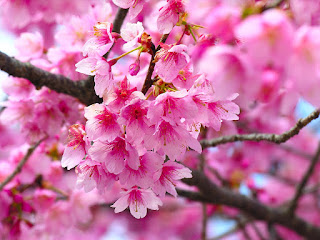Cherry Blossom Flower, Native to Japan, Korea and China, the cherry blossom flower has become a celebrated symbol of both life and death. This is due to the fact that they burst forth in early spring, then fall to the ground within a week. The cherry blossom tree is from the genus prunus, which holds a moderate 400 species. Although the most popular cherry blossoms – the Somei Yoshino – come in a milky white shade that is tinged with a vibrant pink, many cherry blossoms – such as the yaezakura and shidarezakura – can be seen in delicate shades of an almost violet-hued pink.
The cherry blossom flower, unofficially speaking, is considered the national blossom for Japan. This is not surprising, as these blossoms have long been considered some of the most exotic, delicate and entrancing flowers in the world. Festivals and viewings have become cultural staples not only in Japan, but in Canada, the United States and Germany. They have also become a prominent figure in a number of artistic mediums. Many people use this figure in tattoos; sewn into kimonos and silk screened onto t-shirts; painted onto canvas or walls; dried and used as decorative pieces, or simply used as inspiration for music and poetry. The cherry blossom flower has also become a very popular theme for weddings. This is due largely to its romantic and unique beauty; however, it is also used as means to represent hanging on to one another despite the ephemeral nature of existence.
The cherry blossom flower makes for an unusual, elegant and deeply meaningful gift. Despite the overall idea that cherry blossoms are an emblem for the transience of life, they tend to have a different meaning depending upon location. For example, in China they are thought to be the ultimate symbol for feminine beauty, sensuality and strength. The Japanese blossom, however, is meant to represent the Buddhist teachings of the nobility of strength in acceptance of all phases of life. Although many people present these flowers in their more artistic formats, you can very easily give them as single flowers, as a dried branch, or in their more edible, pickled form.







